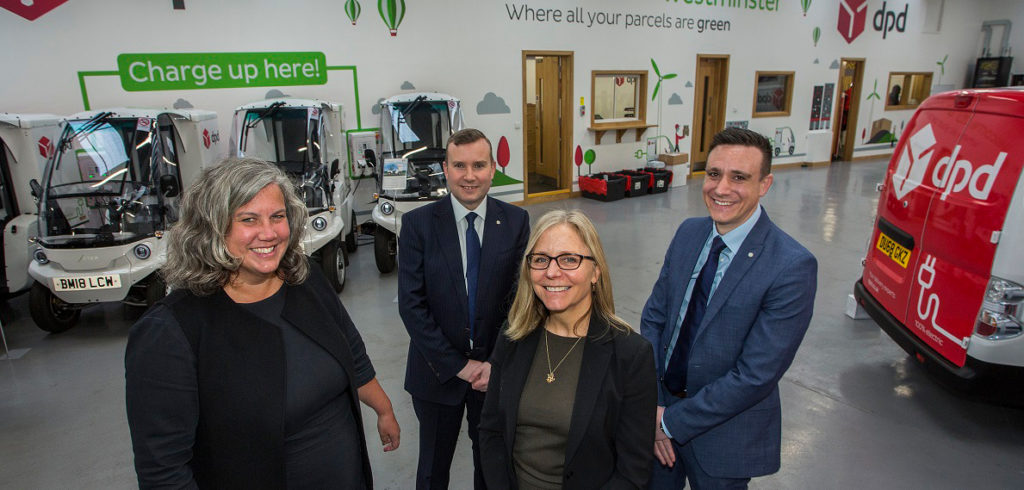Parcel delivery company DPD has backed a plan from the mayor of London and Transport for London (TfL) aimed at transforming how deliveries work in the capital.
The Freight and Servicing Action Plan was launched at DPD’s new, all-electric depot in Westminster, where DPD’s chief operating officer, Justin Pegg, addressed the audience of key stakeholders and provided a demonstration of the innovative operation and its vehicles.
The depot, which opened in October 2018, is completely emission-free for both incoming parcels, served by two 7.5-ton fully-electric FUSO eCanters, and for last-mile deliveries, carried out by a fleet of electric vans and micro-vehicles. DPD has invested £500,000 (US$650,000) in the site, including extensive charging infrastructure, and the depot serves a two-square mile delivery radius in the heart of Westminster.
The plan sets out how the industry can continue to meet the freight and servicing needs of London’s growing population and economy, while decreasing the number of freight vehicles entering central London by 10% over six years.
Actions include:
- Encouraging Londoners to use more sustainable delivery options such as ‘click and collect’ and greener delivery slots;
- Expanding the number of TfL sites housing click-and-collect lockers by launching a tender to bid for space in TfL stations and open more lockers across the network;
- Making smarter use of TfL and borough land by identifying plots that could be used for distribution centers, which are vital to encouraging sustainable last-mile delivery methods such as cycle freight; and
- Reducing harmful emissions caused by freight movements by launching the Central London Ultra Low Emission Zone in April this year.
DPD’s Pegg commented, “We fully support the plans outlined by the mayor and TfL. We are working with them and a wide range of stakeholders to deliver our vision for London. DPD’s central London van fleet already meets the Ultra-Low Emission Zone [ULEZ] standard, but we are looking to go further and create an all-electric fleet and a new network of micro depots across the capital. Micro depots mean shorter journeys, fewer vans on the road and zero emissions.
“While we already have two all-electric micro depots open, there are still challenges to be overcome in terms of electrical infrastructure upgrades, site availability and the supply of electric vehicles on the scale we need for an all-electric fleet across the whole of Central London. But by working in partnership with TfL, landlords and the other major stakeholders, we are well on the way to making deliveries more sustainable and safer.
“In addition to looking at a whole raft of new initiatives and vehicles in the capital, it is also about making every aspect of our core business more sustainable. DPD’s deliveries are already as efficient as possible. Every DPD customer knows, in advance, exactly when we are delivering. That way, they can either be there to accept the parcel or use one of our inflight options to deliver to a safe place, their chosen neighbor or divert to their nearest DPD Pickup parcel shop. As a result, we deliver more parcels first time than any other carrier, which means far fewer wasted miles and repeat journeys to attempt redeliveries.”
DPD also confirmed that it has signed a deal to open its third all-electric depot in Park Lane and have more electric vehicles on order.
Pegg continued, “We’ve just signed a deal with Q-Park which will enable us to open our third all-electric micro depot. Westminster and Shoreditch are up and running and performing really well and our plan is to open eight such sites in total in Central London.
“Finding the sites is a challenge due to rents in London, so we are actively looking for strategic partnerships with landlords. Getting enough vehicles, fast enough is another issue. I’d hope that the vast majority of the vans we buy going forward will be electric, but we are pushing manufacturers to make more right-hand drive vehicles available, more quickly.”


